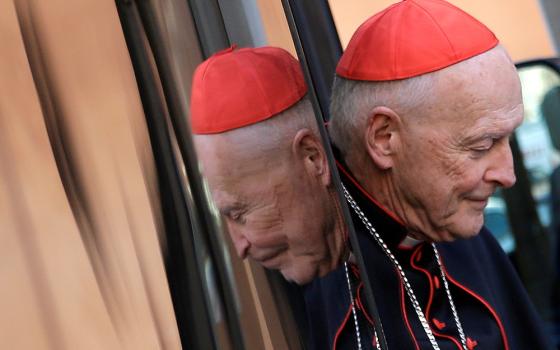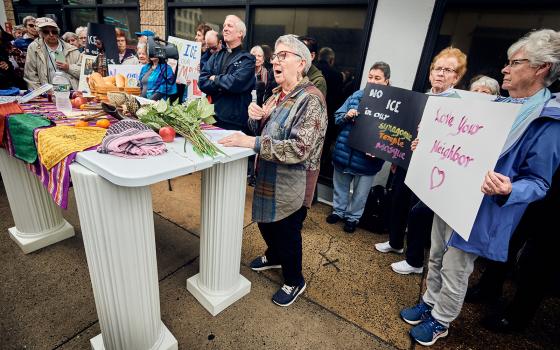COLUMN
On New Year’s Day, Pope Benedict XVI celebrated a Mass commemorating the World Day of Peace. As part of the day’s events, he announced a reconvening of religious leaders in Assisi, Italy later this year to renew their commitment to peace.
While the Pope is willing to promote peace in the world, I can’t help but ask what about peace in his own faith family?
This week marks the ninth anniversary of The Boston Globe’s first coverage of widespread sexual abuse and its cover up within the Catholic Church.
It was Jan. 6, 2002 that the Globe’s Spotlight Team broke the story that the Boston archdiocese had, over a period of decades, moved a priest, John Geoghan, from parish to parish despite numerous allegations of child molestation against him.
Since then, more than 10,000 allegations of sexual abuse have surfaced in the United States alone -- according to the John Jay study -- and new survivors continue to come forward both here and abroad. Despite the fact that nearly a decade has passed since the widespread media coverage and advocacy for youth protection began, there is still little peace within the Church for survivors and those who care for them.
While basic prevention programs have been implemented in the U.S. Church, there remain bishops who -- as recently as this past month -- continue to ignore the United States Conference of Catholic Bishops’ own prevention policies or, after abuse has occurred, make life extremely difficult for survivors once they come forward.
Here is just a sampling of what survivors, and the Catholic community, continues to face nine years after the bishops’ conference passed their Charter for the Protection of Children and Young People and promised change:
Within the last month, Bishop Richard J. Malone of Portland, Maine announced that new credible allegations against seven priests in that diocese had been brought forward but refused to give the priests’ names, some of whom had been identified before.
Malone is not the only one putting children at risk. Bishop Fabian W. Bruskewitz of Lincoln, Nebraska continues to ignore portions of the USCCB Charter and refuses to conduct diocesan-wide background checks, potentially putting thousands of children at risk. (See NCR’s 2008 story: Repeated attempts to petition U.S. bishops fail)
Last October, the San Diego diocese finally released documents chronicling years of sexual abuse -- three years late. (See NCR’s story: San Diego diocese documents released)
In a 2007 settlement with survivors, the Diocese promised to release the papers but then delayed the release for years as it battled the process in court. The documents contain the names of 48 perpetrators, some of whom had never been publicly released; this nearly nine years after the bishops promised openness and accountability for the safety of our children.
In December, the bishop of Winona, Minn. and the archbishop of St. Paul-Minneapolis both filed legal motions to force a survivor of sexual abuse to repay the legal costs the archdiocese incurred fighting against his claims in court -- totaling approximately $130,000.
While the survivor successfully sued the diocese and archdiocese for abuse that occurred between 1980 and 1982, the case was later overturned because the statute of limitations had passed. The archbishop of St. Paul-Minneapolis delayed his motion when he learned the survivor had recently filed bankruptcy and would be unable to pay.
The dioceses’ move against the survivor sends a chilling message to other victims who might have considered coming forward.
Meanwhile, the perpetrator, Thomas Adamson, remains free despite the fact that more than two dozen survivors have accused him of sexual abuse and Adamson himself has admitted abusing youth starting in 1964, according to a database at the BishopAccountability.org Web site.
What’s more, there is no push from the top urging these bishops to make any changes in the way they obfuscate the truth and impede the progress of systemic justice that is desperately needed for the church to heal.
In fact, in his March pastoral letter to the Catholics of Ireland, Pope Benedict tells his brother priests that their response to the crisis “must arise, first and foremost, from your own self-examination, inner purification and spiritual renewal.”
Unfortunately, it is this same individual conversion mentality that enabled religious leaders to think a little therapy and personal transformation would solve pedophilia. Clearly, it doesn’t.
While the Pope celebrates Mass and seeks peace on the global stage, it is only authentic if there is also peace in one’s own family.
I remember the difficult but worthy gospel challenge to reconcile first with those closest to you:
"Therefore, if you are offering your gift at the altar and there remember that your brother has something against you, leave your gift there in front of the altar. First go and be reconciled to your brother; then come and offer your gift." (Matt. 5:23-24)
For the sake of thousands of sexual abuse survivors and the beleaguered church as a whole, it’s time the pope make another new year’s resolution for peace -- not only on behalf of those wounded in distant battlefields, but for those who have been wounded and abused by men and women who have been called soldiers for Christ.
[Nicole Sotelo is the author of Women Healing from Abuse: Meditations for Finding Peace, published by Paulist Press, and coordinates www.WomenHealing.com. A graduate of Harvard Divinity School, she currently works at Call To Action.]
| Editor's Note: We can send you an e-mail alert every time a Young Voices column is posted to NCRonline.org. Go to this page and follow directions: E-mail alert sign-up. If you already receive e-mail alerts from us, click on the "update my profile" button to add Young Voices to your list. |




